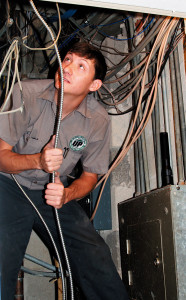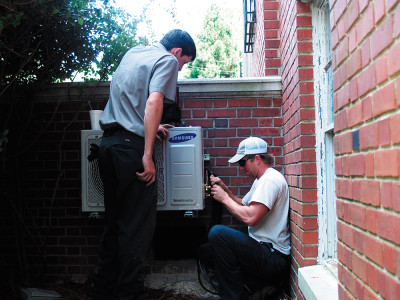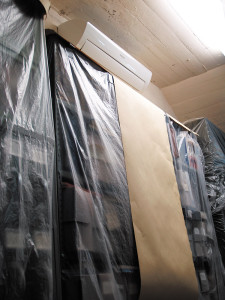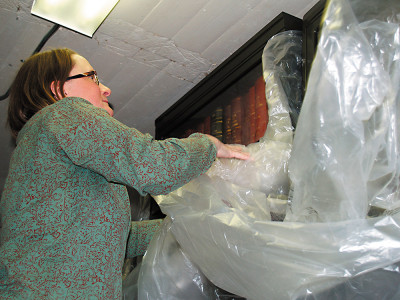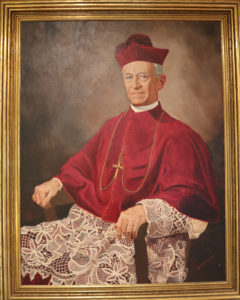
Bishop Oliver Gerow
By Maureen Smith
JACKSON – Catholic Extension is usually lending a helping hand to dioceses, parishes and schools, but this year, the Diocese of Jackson was able to offer its own help to the organization. Timothy Muldoon, director of mission education for Extension, spent a couple days in Mississippi doing research in the diocesan archives for a project on the work of the Church in the Civil Rights Movement.
He is working on a written treatment of “the process that led to the desegregation of Catholic Schools.” His project focuses on the late 1950s through 1964. He came to Mississippi for two reasons, its preeminent place in the history of the Civil Rights Movement and the rich detail offered in the archives here. “My interest is in the fact that the Diocese of then Natchez-Jackson was a place where we had the high-profile murders of Emmett Till and Medgar Evers that cast a spotlight on the state and the diocese,” said Muldoon.
During that time, Bishop Oliver Gerow shepherded the diocese. Bishop Gerow was a photographer and historian as well as being the leader of the local church — keeping a daily diary of his activities and thoughts and creating an index of diocesan history from the founding of the diocese up to his episcopacy. “He had, clearly, a keen sense of preserving history. This is not somebody who did it in a catch-as-catch can way. He was very meticulous,” said Muldoon.
Bishop Gerow worked to unite other faith leaders at the time to soothe racial tensions and bring about reform without violence. Archivist Mary Woodward said his files are some of the most popular among researchers. “We have had several people come and do this topic so we know where everything is so it’s easy. Bishop Gerow has an index that goes all the way up through his time, 1966. His diary has an almost daily account of what went on and in there is a lot of history you don’t get in the history books such as the early efforts of the Episcopal, Methodist and Catholic bishops trying to do something in Jackson to address the racial divide. Meeting with black pastors in different places – having lunch at the Walthall and how Rabbi (Perry) Nussbaum got involved. A lot of that is the flavor behind the history that we have because of Bishop Gerow,” said Woodward.
Researchers are welcome in the archives, but they need to submit a written request to Woodward and they should be working on a specific project, usually an academic one. Genealogists are not able to access these archives, although there is someone families can pay to look up sacramental records. Many of the documents here are originals and not for public viewing. Woodward usually pulls exactly what a particular researcher will need before they arrive to save time and preserve the precious documents.
Bishop Gerow carefully planned and executed school integration in Catholic schools throughout the state. “Bishop Gerow had this sense that you can’t just have a mandate to integrate,” explained Muldoon. “He was concerned with the safety of black congregants. He didn’t want to issue a fiat. He said ‘we have to move carefully,’” Muldoon added. While he was pastoral, Bishop Gerow did sometimes have to draw the line. “We had several incidents of parishioners not being as friendly as they should be and (the archives show) how the bishop reacted to them in terms of telling them ‘this is how it is and if you are going to make people feel unwelcome you can’t receive communion until you go to confession to me,’” said Woodward.
This research is “the perfect focal point for telling the broader story of what was happening in the Catholic Church at that time and what was happening in the nation at that time,” said Muldoon. He explained that examining the phenomenon of segregated parishes can be politically charged so putting it in context is important. There is a difference, he explained, between a segregated parish and a segregating parish. “Individual parishes provided a point of integration into the larger church for many immigrant communities,” he said. Muldoon spoke to Mississippi Catholic from an office in Chicago just a few blocks from four or five different parishes with separate ethnic communities attached to them.
“Initially, parishes provided an integrating community of like-minded people. Black parishes provided cover, for shelter,” he said. He also pointed out that cultural differences do not make parishes less Catholic. “There is a critical difference between homogeneity and Catholicity. It is not about making everyone the same or making them do the same thing,” he said.
Muldoon hopes to complete his writing and find the right spot to publish it in the next few weeks. Watch Mississippi Catholic for publication details.
While he was in the state, he took the opportunity to visit several parishes supported by Extension, including Camden Sacred Heart, Newton St. Anne and a stop at Sister Thea Bowman’s home in Canton. He posted a reflection called “11’o clock on Sunday Morning” about the vibrant community in Camden on the Catholic Extension Website here

